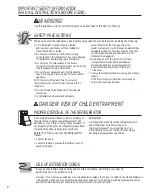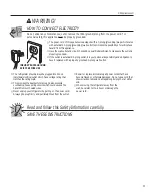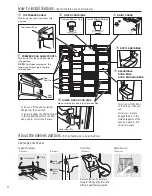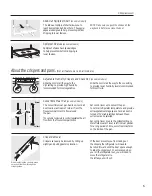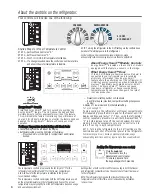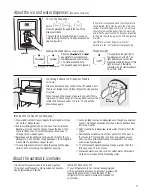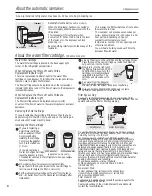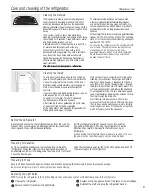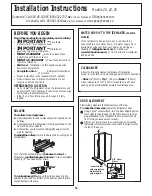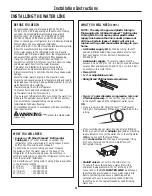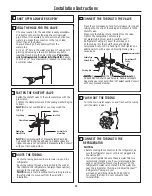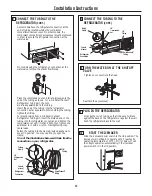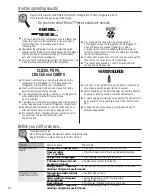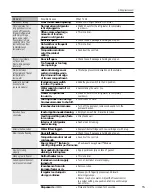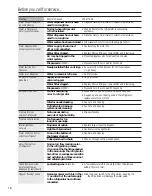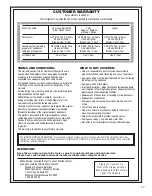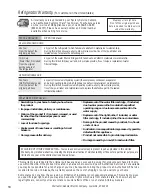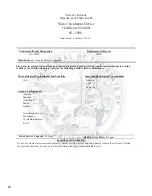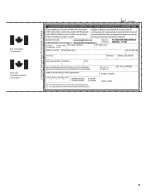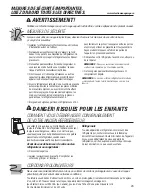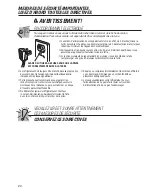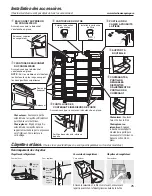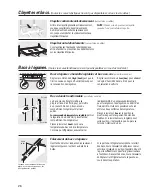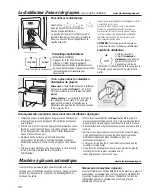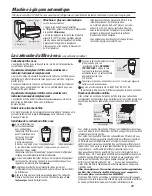
Normal operating sounds.
Troubleshooting Tips
Save time and money! Review the charts on the following
pages first and you may not need to call for service.
Problem
Possible Causes
What To Do
Refrigerator does not
Refrigerator in defrost cycle.
•
Wait about 30 minutes for defrost cycle to end.
operate
Freezer control
•
Move the freezer control to a lower temperature setting.
in
0 (off)
position.
Refrigerator is unplugged.
•
Push the plug completely into the outlet.
The fuse is blown/circuit
•
Replace fuse or reset the breaker.
breaker is tripped.
Energy Smart™ feature is
•
Wait about 2 hours for normal operation to continue.
altering refrigerator performance
Refrigerator or freezer
Temperature control not set
•
See
About the controls.
compartment too warm
cold enough.
Warm weather or frequent
•
Set the temperature control one step colder.
door openings.
See
About the controls.
Door left open.
•
Check to see if package is holding door open.
Energy Smart™ feature is
•
See About Energy Smart™ Models.
altering refrigerator performance
14
Before you call for service…
Newer refrigerators sound different from older refrigerators. Modern refrigerators have
more features and use newer technology.
Do you hear what I hear? These sounds are normal.
HUMMM...
WHOOSH...
The new high efficiency compressor may run faster and
longer than your old refrigerator and you may hear a
high-pitched hum or pulsating sound while
it is operating.
Sometimes the refrigerator runs for an extended period,
especially when the doors are opened frequently. This means
that the
Frost Guard™
feature is working to prevent freezer
burn and improve food preservation.
You may hear a whooshing sound when the doors close. This
is due to pressure equalizing within the refrigerator.
You may hear the fans spinning at high speeds.
This happens when the refrigerator is first plugged in,
when the doors are opened frequently or when
a large amount of food is added to the refrigerator or
freezer compartments. The fans are helping to maintain
the correct temperatures.
If either door is open for over 3 minutes, you may hear the
fans come on in order to cool the light bulbs.
The fans change speeds in order to provide optimal
cooling and energy savings.
CLICKS, POPS,
CRACKS and CHIRPS
You may hear cracking or popping sounds when the
refrigerator is first plugged in. This happens as the
refrigerator cools to the correct temperature.
Electronic dampers click open and closed to provide
optimal cooling and energy savings.
The compressor may cause a clicking or chirping sound
when attempting to restart (this could take
up to 5 minutes).
The electronic control board may cause a clicking sound
when relays activate to control refrigerator components.
Expansion and contraction of cooling coils during and
after defrost can cause a cracking or popping sound.
On models with an icemaker, after an icemaking cycle,
you may hear the ice cubes dropping into
the ice bucket.
WATER SOUNDS
The flow of refrigerant through the freezer cooling coils
may make a gurgling noise like boiling water.
Water dropping on the defrost heater can cause a sizzling,
popping or buzzing sound during the defrost cycle.
A water dripping noise may occur during the defrost cycle
as ice melts from the evaporator and flows into the drain
pan.
Closing the door may cause a gurgling sound due to
pressure equalization.
Содержание GSS20GEWBB
Страница 21: ...Cut here 21...


